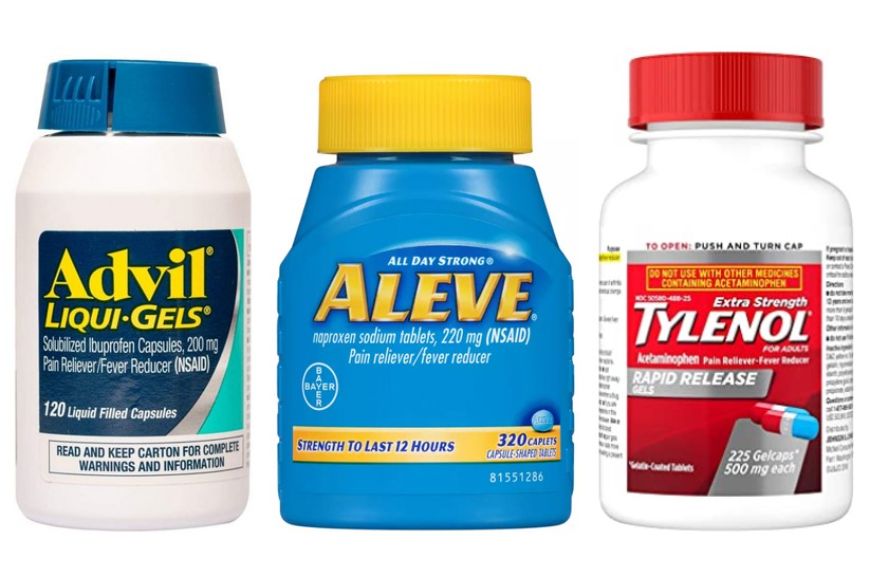Is Aleve Ibuprofen? Exploring Differences, Uses, and Safety
When it comes to pain relief, the world of over-the-counter medications can be a bit perplexing. Among the common queries that arise, the question “Is Aleve Ibuprofen?” stands out. In this comprehensive guide, we dive deep into the distinctions between Aleve and ibuprofen, shedding light on their active ingredients, uses, safety profiles, and more. By the end, you’ll have a clearer understanding of these two popular pain relievers and be equipped to make informed decisions about your health.
Understanding Aleve and Ibuprofen: Key Differences and Similarities
Active Ingredients and Mechanism: Decoding Aleve’s Naproxen and Ibuprofen’s Action
The backbone of any pain reliever lies in its active ingredients, dictating how it works within the body. Aleve’s active ingredient is naproxen, while ibuprofen, as the name suggests, is the key player in ibuprofen-based medications. Both naproxen and ibuprofen belong to the class of nonsteroidal anti-inflammatory drugs (NSAIDs), known for their effectiveness in reducing pain, inflammation, and fever. While they share a common goal, their mechanisms of action are slightly distinct, which can impact their applications and potential side effects.

Uses and Indications: Aleve and Ibuprofen: Targeting Common Pain and Ailments
When it comes to tackling various types of pain, Aleve and ibuprofen have a broad spectrum of uses. Aleve, powered by naproxen, is often employed to manage pain associated with conditions like arthritis, menstrual cramps, headaches, and general muscle aches. Ibuprofen, on the other hand, shines in addressing similar concerns, including headaches, muscle pain, dental pain, and even fever. The key lies in understanding the specific pain or ailment you’re dealing with and choosing the pain reliever that aligns best with your needs.
Safety and Side Effects: Exploring Potential Risks: Aleve vs. Ibuprofen
While Aleve and ibuprofen offer valuable relief, it’s essential to tread carefully and be aware of potential risks. Both medications belong to the NSAID family, and as such, they can share similar side effects, such as gastrointestinal discomfort or elevated blood pressure. However, individual reactions can vary. Aleve might have a slightly longer duration of action, potentially requiring fewer doses throughout the day, but it also comes with a risk of interactions with certain medical conditions and medications. Ibuprofen, on the other hand, may require more frequent dosing but can be gentler on the stomach. It’s crucial to consult a healthcare professional to determine which option is safer based on your unique health profile.
Comparing Effectiveness and Dosage:
Efficacy for Different Ailments: Is Aleve Ibuprofen for Headaches or Menstrual Pain?
When you’re seeking relief from a specific ailment, such as a pounding headache or relentless menstrual cramps, the question of whether Aleve is ibuprofen-worthy arises. Both Aleve and ibuprofen excel in providing relief for various types of pain. For instance, if you’re grappling with a throbbing headache, both options can be effective in alleviating the discomfort. Similarly, when it’s that time of the month and menstrual cramps strike, both Aleve and ibuprofen can offer respite. The choice between the two might come down to personal preference, your body’s response, and any pre-existing health conditions.
Dosage Recommendations: Dos and Don’ts: Proper Usage of Aleve and Ibuprofen
The right dosage is a critical factor in optimizing the effectiveness of any medication while minimizing potential side effects. Aleve and ibuprofen each have recommended dosages that should be adhered to. Generally, for Aleve (naproxen), a dose of 220mg is advised initially, followed by 220mg every 8 to 12 hours, if necessary. Ibuprofen, on the other hand, typically recommends 200mg to 400mg every 4 to 6 hours, not exceeding 1200mg in a 24-hour period. Remember that exceeding these dosages can increase the risk of side effects, so it’s crucial to adhere to the guidelines provided on the packaging or by a healthcare professional.
Duration and Long-Term Use: Short-Term Relief or Long-Term Management: Deciding Right
Pain relief requirements can range from short-term solutions to ongoing management. Aleve and ibuprofen can cater to both scenarios, but their duration of action differs. Aleve’s longer-lasting effects can make it a suitable option for managing chronic conditions such as arthritis, providing steady relief throughout the day. Ibuprofen, with its shorter duration of action, might be preferred for short-term pain or discomfort. If you’re leaning towards extended use, discussing potential effects and risks with a healthcare provider is a wise step to ensure you’re on the right track.
Choosing the Right Pain Reliever:
Consulting a Healthcare Professional: Expert Advice on Aleve vs. Ibuprofen: Which to Choose
When faced with the decision between Aleve and ibuprofen, the expertise of a healthcare professional is invaluable. Your medical history, current health status, and any existing conditions play a significant role in determining the optimal pain reliever for your needs. Consulting a healthcare provider not only ensures that you’re making a safe choice but also takes into account potential interactions with other medications you might be taking. Their guidance can steer you towards the option that aligns best with your overall health.
Personal Health Considerations: Factoring in Pre-existing Conditions, Allergies, and Medications
Each individual is unique, and this applies to how our bodies respond to medications as well. Factors such as allergies, pre-existing medical conditions, and ongoing medications can influence the safety and effectiveness of Aleve and ibuprofen. For instance, if you have a history of gastrointestinal issues, ibuprofen might be a gentler choice due to its potentially milder impact on the stomach. Individuals with certain heart conditions might lean towards Aleve under medical supervision. The critical takeaway is that making an informed decision involves an understanding of your health history and open communication with your healthcare provider.
Duration and Long-Term Use: Discussing Extended Use and Potential Effects with a Doctor
Pain management strategies can span from brief episodes to chronic conditions that require ongoing attention. Discussing your intentions for long-term usage with a healthcare professional is paramount. They can provide insights into the safety, monitoring, and potential effects of extended use. If you’re considering Aleve for continuous pain management, your doctor can guide you on regular check-ups and tests to ensure that your health remains optimal. Equally, if you’re exploring ibuprofen for short-term pain relief, your healthcare provider can recommend appropriate durations and precautions to minimize risks.
Frequently Asked Questions (FAQs) About “Is Aleve Ibuprofen?”
Is Aleve the same as ibuprofen?
No, Aleve (naproxen) and ibuprofen are not the same. While both are nonsteroidal anti-inflammatory drugs (NSAIDs) used for pain relief, they have different active ingredients and mechanisms of action.
Can I take Aleve and ibuprofen together?
It’s generally not recommended to take Aleve and ibuprofen together without consulting a healthcare professional. Combining NSAIDs can increase the risk of side effects.
Is Aleve safer than ibuprofen?
Both Aleve and ibuprofen carry similar risks and potential side effects since they belong to the same NSAID class. Consulting a doctor before use is advised, especially if you have existing health conditions.
Can I use Aleve for headaches like I use ibuprofen?
Yes, Aleve can be used for headache relief similar to ibuprofen. However, it’s essential to follow dosage instructions and consult a healthcare provider if you have questions.
Which is stronger, Aleve or ibuprofen?
The strength of Aleve and ibuprofen can vary depending on the individual and the specific pain being treated. It’s best to consult a healthcare professional to determine the appropriate option for your needs.
Does Aleve work as an anti-inflammatory like ibuprofen?
Yes, both Aleve and ibuprofen are NSAIDs and work as anti-inflammatory agents to reduce pain, inflammation, and fever. However, their effectiveness may vary from person to person.
Can I switch between Aleve and ibuprofen for pain relief?
Switching between Aleve and ibuprofen can be done, but it’s recommended to follow the dosing instructions and consult a healthcare professional if you’re uncertain.
Are there age restrictions for using Aleve and ibuprofen?
Age restrictions vary based on the specific product and its formulation. Some may not be suitable for children under a certain age. It’s crucial to read labels and seek medical advice if needed.
Can Aleve and ibuprofen cause stomach issues?
Yes, both Aleve and ibuprofen can potentially cause stomach issues, including irritation and ulcers. Taking these medications with food or opting for a stomach-friendly formulation can help mitigate risks.
Are there alternatives to Aleve and ibuprofen for pain relief?
Yes, there are alternative pain relief options, such as acetaminophen (Tylenol). However, it’s important to understand the differences and consult a healthcare professional to choose the best option for your specific needs.
Conclusion:
In the world of pain relief, the question “Is Aleve ibuprofen?” reveals layers of information that extend beyond a simple yes or no. By delving into the differences, uses, safety profiles, and considerations of these two common pain relievers, you’ve gained the tools to make a well-informed decision. Remember that while this article provides comprehensive insights, personalized advice from a healthcare professional is key to ensuring the best choice for your health.






